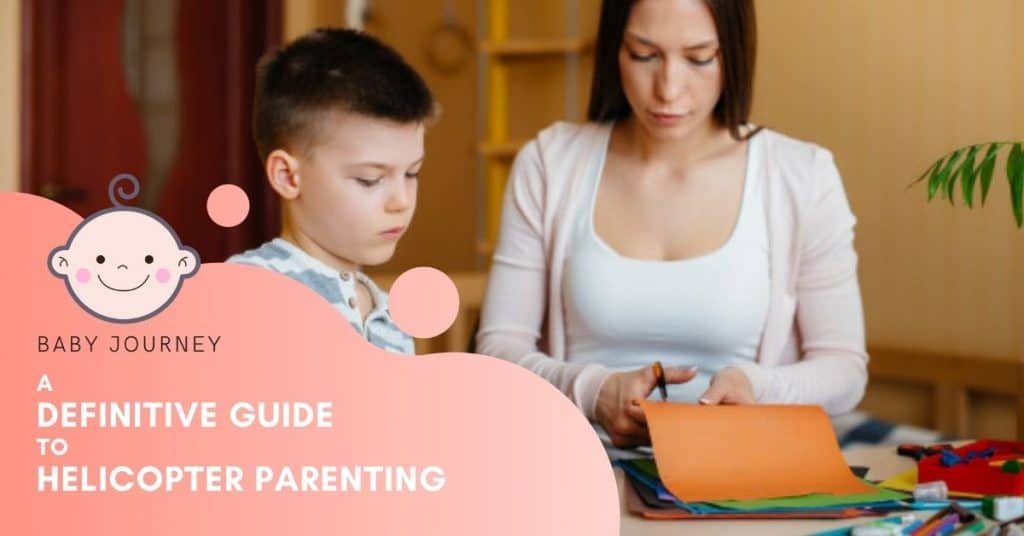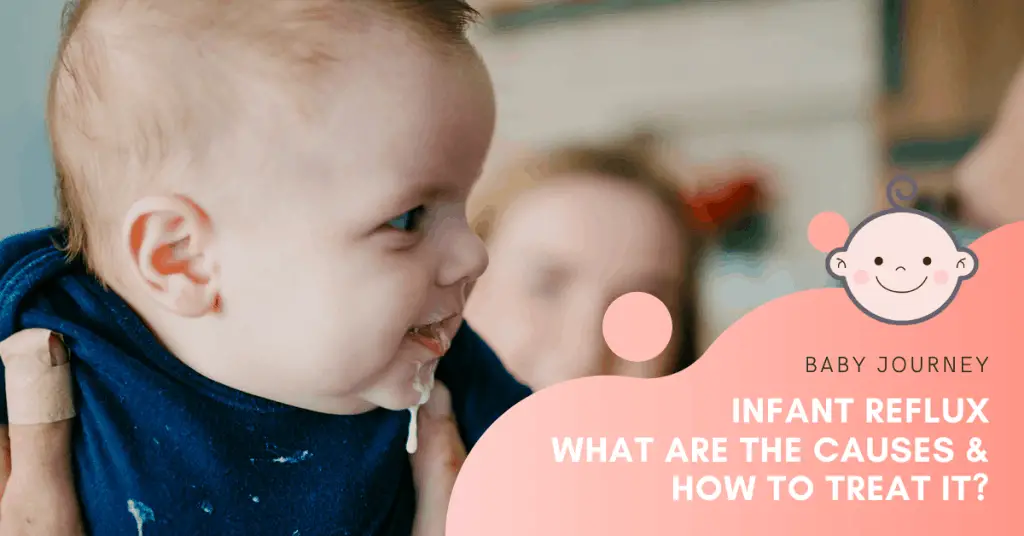Welcome to our definitive guide on helicopter parenting!
Helicopter parenting is rather common in the world today, so much so that some of us parents may or may not be aware it. In this guide, we will go through the signs, the effects and how to avoid being a hovering parent to your kid.
But just what is helicopter parenting?
Is it always negative?
Could you be helicoptering?
Let’s find out!
Chapter 1:
Introduction to Helicopter Parenting
In this chapter, we will talk a little bit about what it means by helicopter parenting.
We will also cover some of the common terms related to helicopter parenting.
Let’s dive in.
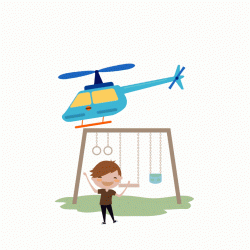
The Case of the Hovering Parent
The phrase helicopter parenting is commonplace today. It is used to describe parents who are so focused on their children it can prevent both the child and the parents from living a normal life.
Even though the phrase and parenting style are well-known today, it hasn’t always been that way.
The term helicopter parenting was officially added to the dictionary in 2011 but first appeared in publication in 1969. In Dr. Haim Ginott’s book, Parents & Teenagers teenagers used the phrase to describe a hovering parent.
What is Helicopter Parenting?
The term helicopter parenting has been around for a while. It was first used by teenagers to describe moms or dads who hovered over them constantly, like a helicopter.
In the second decade of the 2000s, the term made a resurgence, being officially added to the dictionary. The formal definition of a helicopter parent is:
“A parent who is excessively involved in the life of his or her child”
It can be expanded to include terms like helicopter mom or helicopter dad. This refers to when a specific parent is the one overly focused on their offspring.
Copter mommies, a colloquial spin-off, was made famous by a song parody. The song highlighted the tendencies of hovering parents.
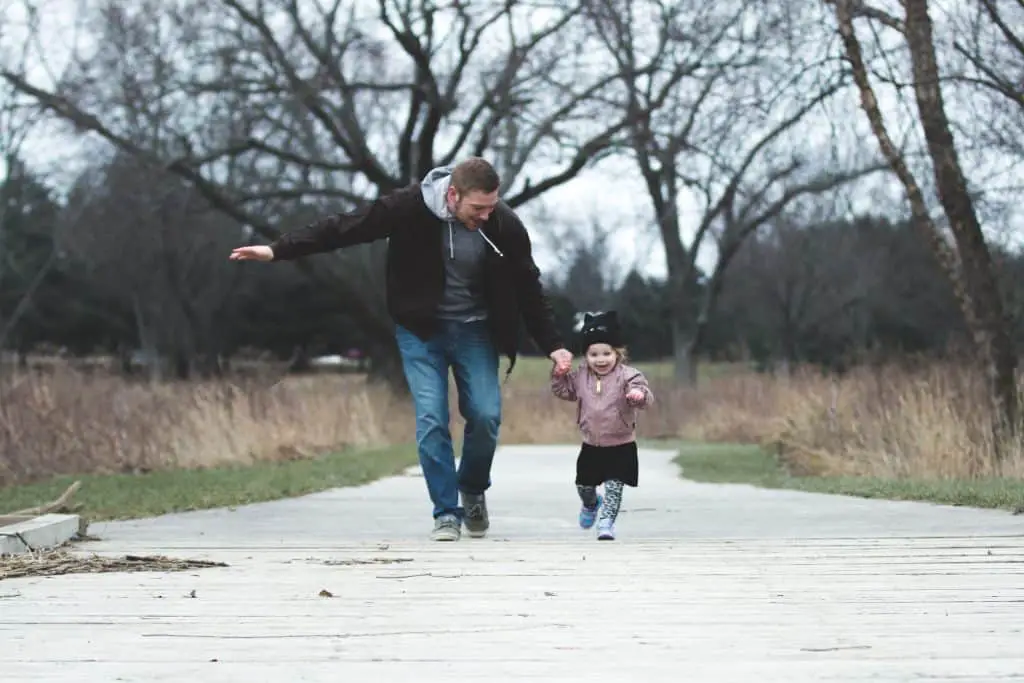
While having some involvement in your child’s life is great, helicopter parents take involvement to the next level, even greater than the love and adoration shown by grandparents. They are overly-involved and engage in over-parenting.
Think of it as the opposite of free-range parenting. Neither parenting style may be ideal, but helicopter parenting can have deep-rooted causes that can be difficult to change.
But why would a parent go to such lengths of parenting?
That’s what I’m going to cover in the next chapter.
Keep reading…
Chapter 2:
Causes of Helicopter Parenting
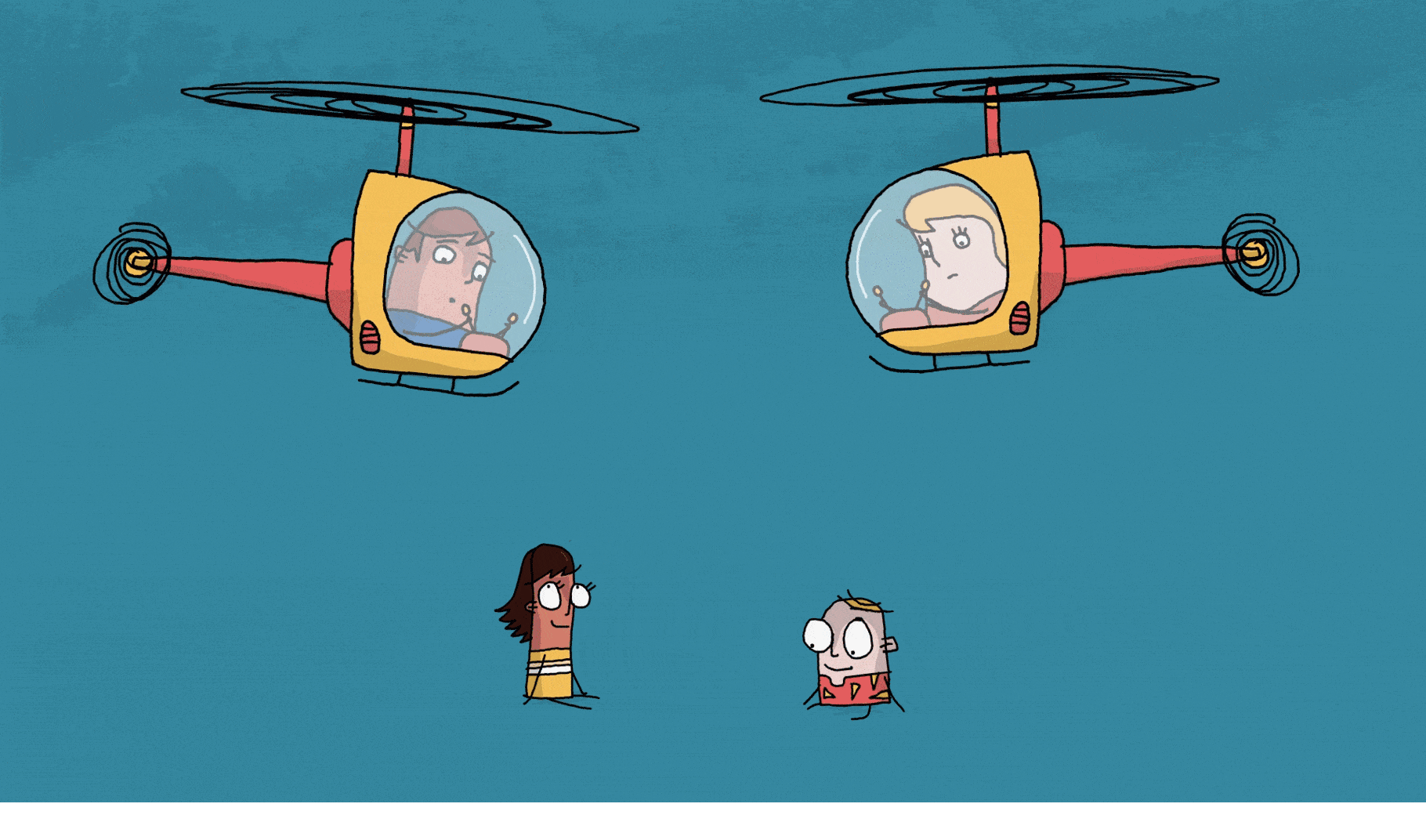
But as we read from the helicopter parenting definition, sometimes this protection can go over and above.
The cause? Parents may become overly involved in their child’s lives for a variety of reasons. These are what contribute to helicoptering:
Anxiety
Fear of Helplessness and Rejection
Overcompensation
Sense of Purpose
As a helicopter parent, you tend to exert the same ideas onto your kid – by forcing them to have the same goals and vision you have.
Similarly, that sense of purpose could be the other way round – you shoulder all your child’s goals. If your child aims to be a great musician, you make all the effort to study music as well, with the hopes of assisting your child to excel as a musician in every single step.
Competition and Peer Pressure
Child’s Personality and History
There is also a possibility that you weren’t a helicopter parent from the start until certain events during parenting happen, that trigger you to go into heliparenting to be in control of the situation.
Maybe your child’s character or past experiences naturally drove you to helicopter parenting.
Perhaps you always had to be very hands-on with your child to prevent meltdowns or shelter them from a bully.
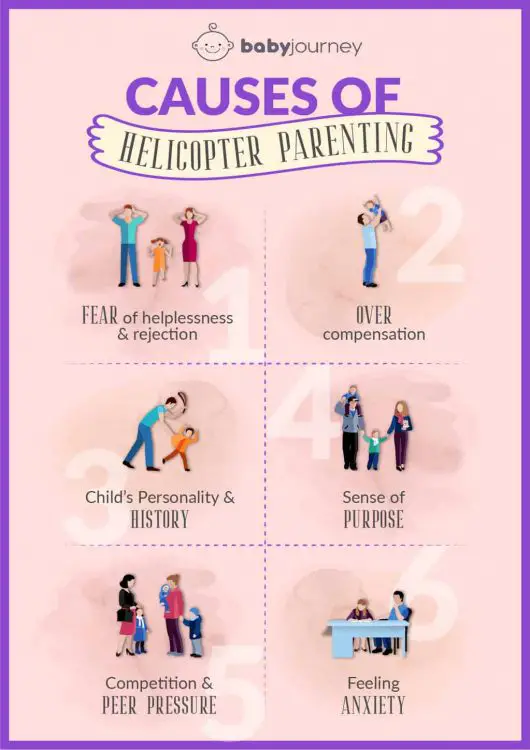
Now that you know the various causes, let’s talk about the signs.
Chapter 3:
4 Obvious Signs That You're A Helicopter Parent
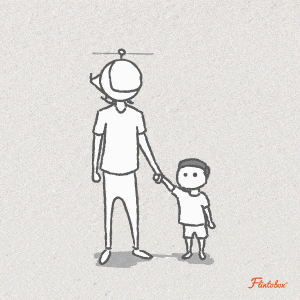
#1
Fighting For Your Child
Fighting For Your Child
Fighting for your child means fighting for their rights. This means that you don’t allow them to fight their own battles, whether it be a dispute over a toy with a friend or a grievance with a teacher about a grade.
#2
Always Having Disputes with Teachers and Coaches
More often than not, helicopter parents are the ones that are always in the school office.
#3
Doing Work For Your Child
#4
Overprotective of Their Safety
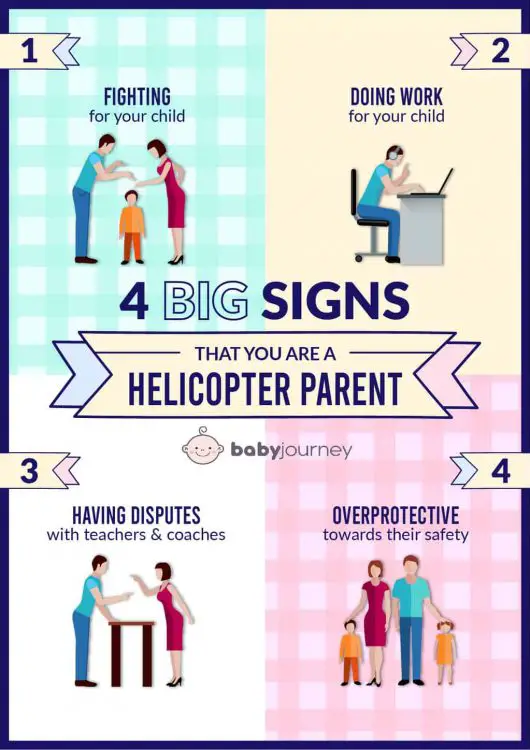
Not sure if you’re a helicopter parent after reading through those signs? Here, we further divide the parenting style into for different stages.
Helicopter Parenting at Different Ages & Stages
 Newborns & Infants
Newborns & InfantsWhile the newborn and infant stage often requires attachment parenting to improve parent-child bonding, sometimes parents can go overboard when thinking about the potential dangers their little ones may face. This may then lead to helicopter parenting.
In this stage helicopter parents may be overprotective of their child. They won’t take them out of the house, let others hold them, or even let their child leave their sight. These parents also tend to install baby monitors to watch over their child without miss.
Some may consider these behaviors as just postpartum anxiety, but helicopter parents act on their worries on a more aggressive ground. They refuse to go on date nights, refuse to transition their child to a separate bedroom, or even take a shower for fear of letting someone else watch their baby.


Helicopter parents of elementary schoolers may exhibit more pronounced tendencies.
Once their child enters grade school the threat to their future becomes more tangible. They will advocate for their child by filing grievances with the school, having disputes with teachers and coaches, and even try to hand-select their child’s teachers.

Since teens originally coined the phrase helicopter parenting, you can imagine that at this stage the characteristics are quite apparent.
At school, parents fight teachers, staff, administrators, and coaches on their child’s behalf. They continue to complete schoolwork and projects for their child.
They may even go as far as contacting colleges and universities for their kid.
They also attempt to settle disagreements with those outside of school, including their child’s friends, peers, or employers.
They don’t allow their kids to make age-appropriate choices, which includes taking age-appropriate risks and learning valuable life lessons.
They become immersed in sheltering their child from any disappointment and preparing a way for a smooth future.
By and large, helicopter parents want to know where their child is at all times. If they aren’t physically near their child to protect them they will take steps to make sure they are still safe by involving themselves with their kid’s school, friends, groups, and teams.
Their goal is to protect the child physically, emotionally, and socially.
Chapter 4:
Are There Benefits to Helicopter Parenting?
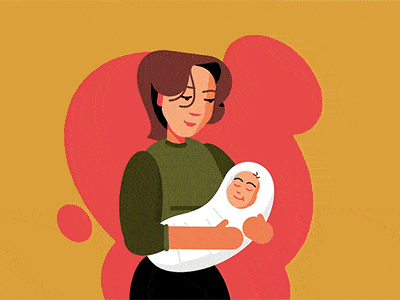
Protection can’t be all bad right?
As bad as it sounds, there are a few positive aspects of helicopter parenting.
The Good Side of Helicoptering
As helicopter kids they are generally the ones who do well in school, show up on time, and report for activities and games.
Thanks in part to their parents, these kids typically do well academically and may succeed in sports and extracurricular activities.
Their parents do their best to support them academically, socially, and emotionally. If their grades start to decline, they are being bullied or dealing with other issues their parents will likely know about it. This can have some advantages.
Finally, helicopter parents are usually involved in their child’s activities and interests. To keep up this level of involvement they may volunteer for many of their child’s events.
Chapter 5:
Dealing With The 6 Consequences of Helicopter Parenting
With every perk, there will be a downside.
In this case, there are more bad consequences of helicopter parenting than good ones though.

#1
Lack of Independence
Lack of Independence
#2
Poor Problem Solving and Coping
Poor Problem Solving and Coping

#3
Decreased Confidence and Self-Esteem
Decreased Confidence and Self-Esteem
Because helicopter parents hinder age-appropriate risk-taking and decision making, their children may have decreased self-confidence and self-esteem.
Parents fixing everything and paving the way for their child may not make the child feel more successful but instead less successful.
#4
Lack of Life Skills
#5
Sense of Entitlement
#6
Lack of Empathy
Chapter 6:
How to Avoid Helicopter Parenting
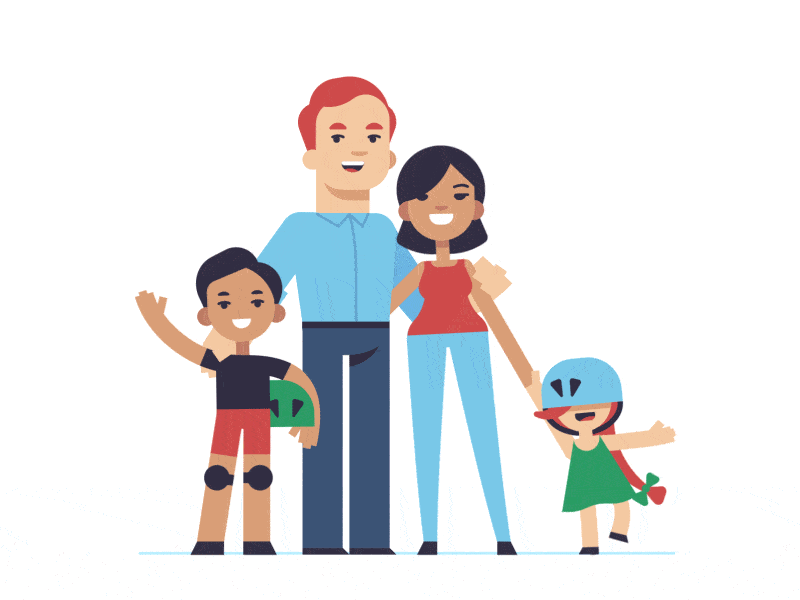
Let Them Fail
Teach Them to Fish, Not Give Them the Fish
Give a man a fish and you feed him for a day; teach a man to fish and you feed him for a lifetime.
Give Them Space
Provide them with adequate space to do things on their own. This can be playing in the outdoors by themselves, having to clean their room, or even trying out for a team.
You can help teach them, encourage them, and give them the skills to be successful but then take a step back and let them shine.
Even so, having ideas or references to help you parent your child is always a welcome thing. Here are some great self-help parenting resources to help you out.
Chapter 7:
The 5 Best Self-help Parenting Books to Reduce Helicoptering
#1
The Overparenting Epidemic: Why Helicopter Parenting Is Bad for Your Kids . . . and Dangerous for You, Too! By George S. Glass M.D.
Authors George and David outline the characteristics of overparenting and the consequences for the children, as well as how to avoid helicoptering and its ill effects.
#2
How To Raise An Adult by Julie Lythcott-Haims
Author Julie Lythcott-Haims uses research combined with interviews and firsthand conversations to show the negative consequences of helicopter parenting, both for the parents and their children.
#3
Stop Parenting: One Helicopter Mom's Life-Changing Transformation by Karen R. Tolchin
Author Karen R. Tolchin uses her own struggles with being a helicopter mom and her ensuing conversations with her life coach to share how overparenting can negatively affect both parents and children.
#4
Kid Confidence (Help Your Child Make Friends, Build Resilience, and Develop Real Self-Esteem) by Eileen Kennedy-Moore
Author Eileen Kennedy-Moore, a licensed clinical psychologist and parenting expert, offers plenty of practical advice on how to raise a confident and self-sufficient child. These strategies are helpful in reducing the effects of overparenting.
#5
Achtung Baby: An American Mom on the German Art of Raising Self-Reliant Children by Sara Zaske
Sara Zaske reflects on her time in Berlin and her realization that German parenting is a lot different than American parenting. She shares personal lessons learned about how this parenting style excels in raising independent, confident, and self-reliant children.
While you may not be a helicopter parent, it is good to understand the other types of parenting so that you are aware of the way you parent your child.
Chapter 8:
Understanding Other Types of Parenting Styles
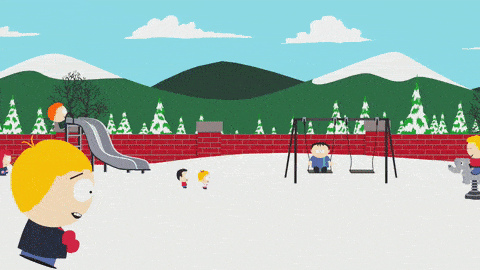
Authoritarian parents
Authoritative parents
Permissive parents
Neglectful parents
Free-range parents
Lawnmower parents
Tiger parents
While one parenting type isn’t perfect, some are better than others. Most generally agree that an authoritative parenting style works best.
Helicopter Parents, a Recurring Trend
Helicopter Parents, a Recurring Trend

That’s it for my guide to helicopter parenting.
Last update on 2024-04-20 / Affiliate links / Images from Amazon Product Advertising API

